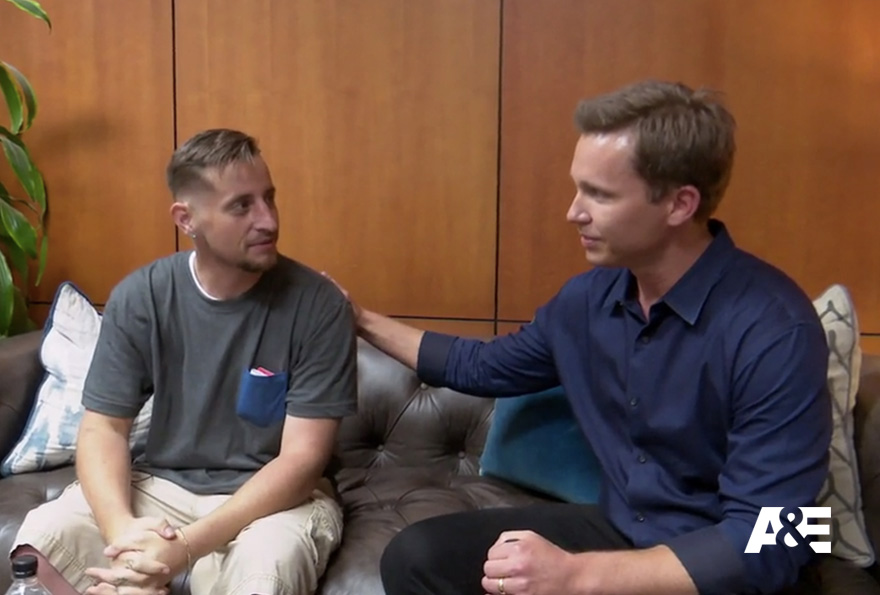When you’ve got nothing left to lose, you are capable of anything – which can be good or bad. For risk-takers, this can be an opportunity to live like you’ve never lived before. It’s the beginning of a new life, a fresh start, to go after dreams you have not yet realized because nothing is holding you back anymore. But when you’ve lost everything that is dear to your heart – your family, your livelihood, your children – all the things that give meaning to your existence on Earth, you become dangerous…to society and to yourself. In an episode on A & E Intervention that aired on June 5, 2018, the story of Sam and Brad’s crumbling codependent marriage unfolded as their loved ones cried out for help to save them from what could lead to their self-destruction.
The decision to use and abuse drugs and alcohol doesn’t just affect the user alone; drug abuse has a ripple effect on everyone who’s close to us in our lives, most noticeably our significant others and family members who suffer just as much (if not more). The power of love can tear down the walls that alienate addicts from their loved ones when families unite together with the help of addiction professionals. On A & E Intervention, you will get to witness how Sam and Brad have an opportunity to turn their lives around through New Method Wellness, and the message of hope doesn’t just ring true for Sam and Brad…it rings true for everyone who persists in possibilities and never gives up.
Codependent Relationships: The Fruit of Drug and Alcohol Dependency
How does drug and alcohol addiction create codependency in a relationship? Before addiction creeps into a couple’s life, pre-existing emotional factors play a role in the direction that the relationship takes. Alcohol, illicit drugs or misuse of prescribed drugs can negatively affect an otherwise emotionally healthy relationship when substance abuse starts to interfere with the brain’s reward and stress systems.
Codependency is an unhealthy, one-sided relationship in which one partner supports or enables the other person’s drug addiction, alcoholism or other destructive habits, often at the expense of self-care. The codependent caretaker spends much of the time trying to meet the emotional and/or physical demands of the other partner, which makes it easier for dysfunctional behaviors to continue.
Do you know if you’re in a codependent relationship? Here are some ways you can tell:
Signs of a Codependent Caretaker (known as the Enabler)
• Do you tend to jump in and help others when you know perfectly well that they can do it for themselves?
• Do you pay for other people’s consequences instead of letting them deal with their own?
• Are you constantly picking up the slack when others drop the ball?
• Do you find yourself self-sacrificing too much (even to your own detriment) in order to
feel better about yourself?
• Has anyone told you that you keep making excuses for your partner?
• Have you ever felt like your partner is too needy, but you stay in the relationship anyway
because it fulfills your need “to be needed”?
Signs of a Codependent Partner (known as the Manipulator)
• Usual phrases: “After all I’ve done for you…” “Who, me?”
• Plays the victim
• Rationalizes irresponsible behavior
• Makes negative comparisons about you: “Everyone is saying this about you…”
• Complains, denies, and lies about the truth
• Hardly ever comes through with a promise
• It’s always someone else’s fault
How do you break the codependency cycle?
When one partner introduces substance abuse to a relationship, it could produce codependency or exacerbate the codependency that’s already there. It’s hard for most people to identify themselves as either the enabler or the manipulator, but to close friends and family, the signs are obvious. If the enabler turns a blind eye to the manipulator’s alcohol and drug addiction, an intervention must be staged since neither partner is likely to seek help for addiction treatment. Family members must learn to recognize signs of drug addiction and codependency in their loved ones to avoid more serious consequences like depression and drug-related suicide.
Family Dynamics and Substance Abuse Addiction
Addiction isn’t just one person’s disease; it’s a family disease, because not only does it produce mental and emotional distress, it also has far-reaching consequences such as economic hardship, legal problems, and disruption of children’s developmental growth. Addiction treatment for the substance user alone would only limit the effect of treatment, which is why New Method Wellness incorporates family group therapy as part of their treatment programs to ensure the success and recovery of the whole family.
Saving Grace of Intervention
It’s never too late to intervene, and the sooner you do, the better your chances of saving the lives of your loved ones. New Method Wellness is one of the nation’s best alcohol and drug rehab centers, offering comprehensive care which integrates holistic therapy with evidence-based practices in a dual diagnosis treatment setting.
Are you seeking help on behalf of loved ones? Call 866.951.1824 today!
To see why Dr. Phil recommends New Method Wellness, click here!







